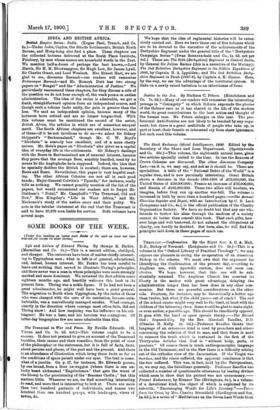INDIA AND BRITISH AFRICA.
British Empire Series : India. (Began Paul, Trench, and Co. 6s.)—Under India, Ceylon, the Straits Settlements, British North Borneo, and Hong-kong also find a place. These chapters are the collected lectures delivered at the South Place Institute, Finsbury, by men whose names are household words in the East. We mention half-a-dozen of perhaps the beat known,—Lord Harris, Sir M. M. Bhownaggree, Sir Hugh Low, Sir James Lyall, Sir Charles Grant, and Lord Wenlock. Mrs. Ernest Hart, we are glad to see, discusses Burmah—our readers will remember Picturesque Burmah—and Mr. Bornesh Dutt has two strong papers on " Bengal" and the "Administration of Justice." We particularly recommend these chapters, for they discuss a side of the question we do not hear enough of, the weak points in Indian administration. The idea of the series is admirable, we get a frank, straightforward opinion from an independent source, and thmigh such a volume lacks unity, the gain is greater than the lose. We said an independent opinion, because many of the lecturers have retired and are no longer tongue-tied. With this volume must be mentioned the second of the series, British Africa, the articles in which are of somewhat unequal merit. The South African chapters are excellent, however, and of-these—if it be not invidious to do so—we select Sir Sidney Shippard's " Bechuanaland," though Mr. C. W. Boyd's "Rhodesia" is scarcely less excellent, and of a more chatty nature. Mr. Hole's paper on "Rhodesia" also gives us a capital idea of everyday life in the settlements. Sir Sidney's dealings with the Boers in Bechuanaland are of unusual interest, because they prove that the average Boer, sensibly handled, need by no means be the Anglophobe he is supposed. Indeed, the idea that he specially dislikes the British is scouted; there are, however, Boers and Boers. Nevertheless, this paper is very hopeful read- ing. The other African Colonies are not all in such good hands ; Major-General Colville's "Uganda," for instance, really tells us nothing. We cannot possibly mention all the list of the papers, but would recommend our readers not to forget Mr. Statham's " Natal," Mr. Campbell's " The Transvaal, Old and New," Miss Kingsley's "Life in West Africa," and Mr. Mackenzie's study of the native races and their polity. We note in the tabular statement at the end that the Transvaal is said to have 26,299 men liable for service. Both volumes have several maps.
































 Previous page
Previous page